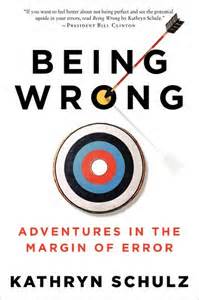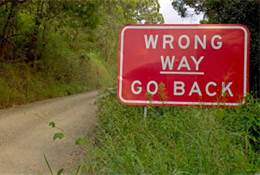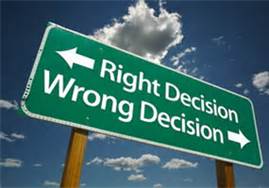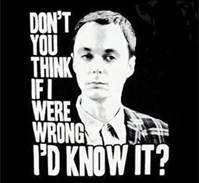Is being “wrong” ever “right”?
There are some things I take for granted:
My car will start when I turn the key.
I will wake up in the same place I fell asleep.
Chicken tastes like chicken.
People will disagree with me.
My bank will not lose my money.
Some people will be born, others will die.
Change happens.
I could fill a page with what I know will most likely happen.
 But what if what I think will happen, doesn’t? Is it possible that my car will not start, I will be transported to another dimension, everyone will agree with me, and the bank will lose my money? Sure. So, do I live as a pessimist or an optimist? Do I assume all hell will break loose or Heaven is still in charge? Is it “wrong” to think I’m “right”?
But what if what I think will happen, doesn’t? Is it possible that my car will not start, I will be transported to another dimension, everyone will agree with me, and the bank will lose my money? Sure. So, do I live as a pessimist or an optimist? Do I assume all hell will break loose or Heaven is still in charge? Is it “wrong” to think I’m “right”?
Have you ever heard of a “wrongologist”? Neither had I until I began to read the writings of Kathryn Schulz. Schulz’  statement is hard to argue
statement is hard to argue
However disorienting, difficult, or humbling our mistakes might be, it is ultimately wrongness, not rightness, that can teach us who we are. [1]
Schulz correctly states that being wrong is useful, beneficial, the essence of discovery. I would also agree that error is embedded in our species and that we are wrong to assume we are always right. It is also clear that we all believe what we want to believe, rationalizing our wrongs.
But I wonder if Kathryn Schulz would ever consider any wrongs, wrong.
Can there ever be “wrong” and not “right”?
Is “wrong” just a process or is “wrong” an absolute state of being?
Is the state of being “wrong,” a state we can live in?
I struggle with the obvious tension:
Isn’t being right about wrongness just another way of being wrong about being right?
People speak or teach because they think they are right: we are certain of some things. Do I believe in uncertainty? Sure! Read my essay. Failure can surely lead to success. Admitting my errors makes me more caring when others mess up. Knowing I could be wrong even gives me some optimism. If I am wrong, someone somewhere must be right.
 Ms. Schulz celebrates being wrong as right. But the truth is you can’t have one without the other. In fact, in order to know what is wrong, right must exist. The only way we can declare that something is “wrong” is if there is a “right.” My belief does not make that so.
Ms. Schulz celebrates being wrong as right. But the truth is you can’t have one without the other. In fact, in order to know what is wrong, right must exist. The only way we can declare that something is “wrong” is if there is a “right.” My belief does not make that so.
The world works in a certain way.
The sun “rises” and “sets.”
The earth spins around the sun.
The laws of gravity, planetary movement, and thermodynamics do not change.
We all depend upon standards.
If someone steals our money, we call the police to catch the crook.
If we are treated unjustly, we hire a lawyer to represent us in court.
We all trust something or someone.
I trust my mechanic to not break my car, my banker to not lose my money, my website administrator to represent me well in cyberspace, the president of my institution to lead in the right direction, and the restaurant chef not to poison my meal.
We certainly trust people but do so with some uncertainty.
Do I live with certainty uncertainly? Sure. I am a fallen, finite, fragile human.
Do I live with certainty as certain? Sure. There is a Personal, Eternal, Triune Creator Who has a set standard of right, communicating the rightness to humans, and granted choice to humanity to abide by right or wrong. When we chose wrong, He made the wrong right through the righteousness of His sacrifice.
God is the only One who can make the wrong, right.
Mark knows he is sometimes wrong but knows The One Who is always Right. Personally seeking Truth wherever it’s found, Dr. Mark Eckel is Professor of Leadership, Education, & Discipleship at Capital Bible Seminary.
[1] https://www.brainpickings.org/index.php/2011/04/04/must-read-books-being-wrong/


Constantly we hear, “I made a mistake”, “he made poor choices”, or “she should have done it differently”. Very rarely do we apply the term “wrong” in describing going askew. Instead of embracing our wrongs, we may only share a tangent element of the facts, that we blew it. Getting someone, especially ourselves to admit we were ‘wrong’ takes some pride pummeling. By diluting the accountability to admitting we were wrong, we skirt our dependency on the only ONE who can make it right.
In raising my son, who is not deeply rooted and celebrated as a “terrible two”, I remind myself often of his wrongness as a way of leading to better rightness. I would be concerned and possibly doubt the ONE true messiah, if my son, miraculously made no wrongs. The greater question becomes, and more for me, as to how I will help my son, my students, myself even deal with lessons to be learned from being wrong. And in being wrong, do we find greater truth, understanding, and grow in wisdom of the mistakes we make or identify in society. Too often I am afraid we fail to acknowledge wrongness in fear of being wrong. Greater truth and in my belief, the only real existence of growth, comes from a healthy and acknowledged development of wrongness. I am thankful for our infinite RIGHT guide in helping me to decipher through the many wrongs in my life.